Beneficial Effects on Energy, Atherosclerosis and Aging
By Ward Dean, MD and Jim English
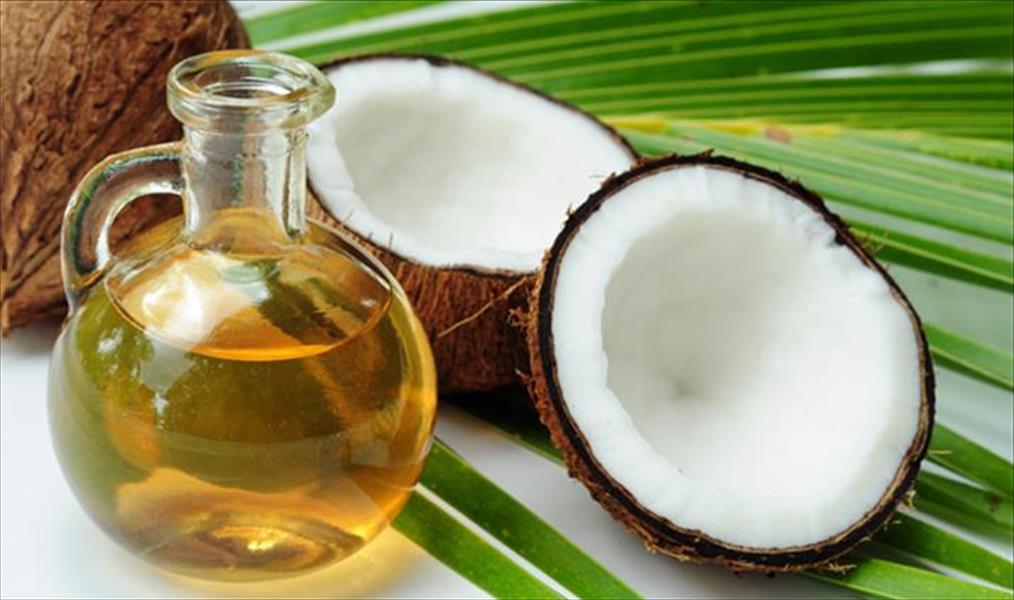 Medium Chain Triglycerides (MCTs) are a unique form of dietary fat that impart a wide range of positive health benefits. Nevertheless, the potential anti-aging properties of MCTs have been largely unrecognized by many life extension enthusiasts. Dietary fats are molecules composed of individual carbon atoms linked into chains ranging from 2 to 22 carbon atoms in length. Long Chain Fatty acids (LCTs) ranging from 12 to 18 carbons long are the predominant form of fat in the American diet. MCTs, by contrast, are composed of only 6 to 10 carbon links. Because of their shorter chain length, MCTs have a number of unique properties which give them advantages over the more common LCTs.
Medium Chain Triglycerides (MCTs) are a unique form of dietary fat that impart a wide range of positive health benefits. Nevertheless, the potential anti-aging properties of MCTs have been largely unrecognized by many life extension enthusiasts. Dietary fats are molecules composed of individual carbon atoms linked into chains ranging from 2 to 22 carbon atoms in length. Long Chain Fatty acids (LCTs) ranging from 12 to 18 carbons long are the predominant form of fat in the American diet. MCTs, by contrast, are composed of only 6 to 10 carbon links. Because of their shorter chain length, MCTs have a number of unique properties which give them advantages over the more common LCTs.
Until the early 1980s, MCTs were predominantly available only as a constituent of butter, coconut oil, and other natural sources. However, Dr. Vigen K. Babayan of the Nutrition Laboratory, Harvard University, developed a process to produce them in large quantities, to be used primarily for therapeutic uses in a number of conditions. (1)
 MCTs, Energy and Exercise
MCTs, Energy and Exercise
MCTs provide about ten percent fewer calories than LCTs – 8.3 calories per gram for MCTs versus 9 calories per gram for LCTs. But this is just one of the unique advantages of MCTs. (2) More importantly, reduced chain length also means that MCTs are more rapidly absorbed by the body and more quickly metabolized (burned) as fuel (Fig. 1). The result of this accelerated metabolic conversion is that instead of being stored as fat, the calories contained in MCTs are very efficiently converted into fuel for immediate use by organs and muscles.
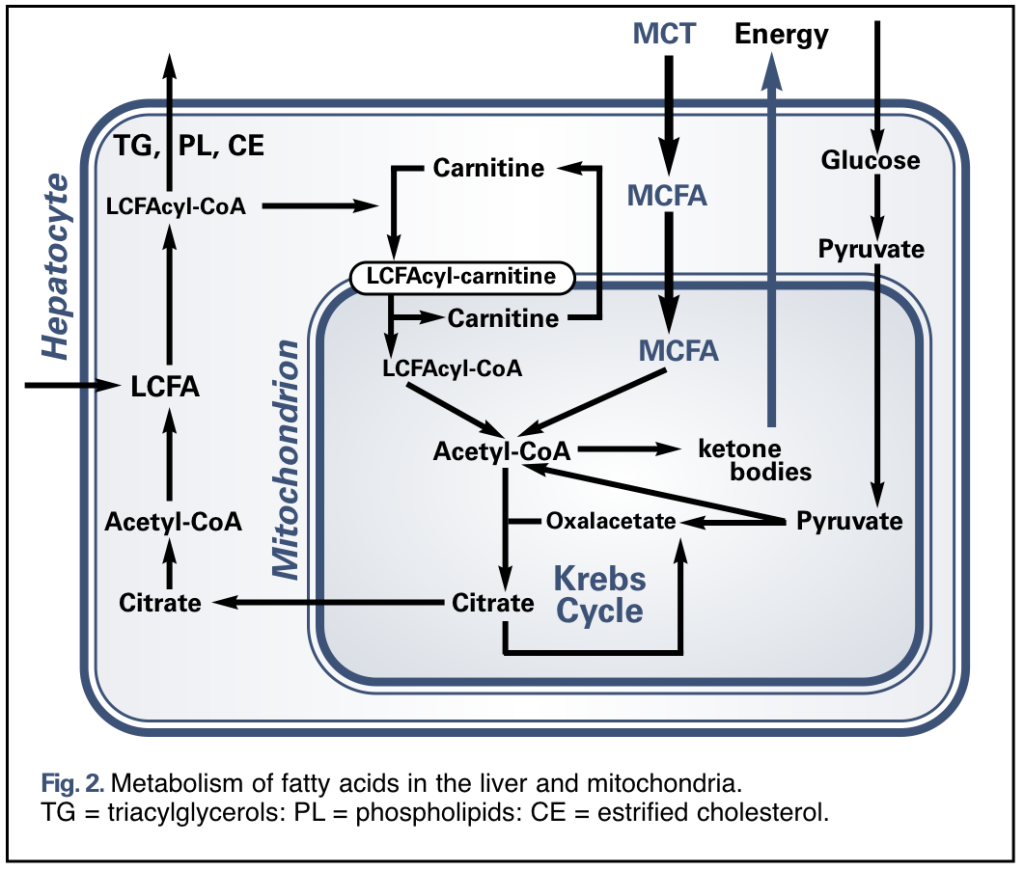 The energy-enhancing properties of MCTs are attributed to the fact that they cross the double mitochondrial membrane very rapidly, and do not require the presence of carnitine, as do LCTs (Fig. 2). The result is an excess of acetyl-coA, which then follows various metabolic pathways, both in the mitochondria (Krebs Cycle) and in the cytosol, resulting in the production of ketones. Scientists attribute the increased energy from consumption of MCTs to the rapid formation of ketone bodies. MCTs are thus a good choice for anyone who has increased energy needs, as following major surgery, during normal or stunted growth, to enhance athletic performance, and to counteract the decreased energy production that results from aging.
The energy-enhancing properties of MCTs are attributed to the fact that they cross the double mitochondrial membrane very rapidly, and do not require the presence of carnitine, as do LCTs (Fig. 2). The result is an excess of acetyl-coA, which then follows various metabolic pathways, both in the mitochondria (Krebs Cycle) and in the cytosol, resulting in the production of ketones. Scientists attribute the increased energy from consumption of MCTs to the rapid formation of ketone bodies. MCTs are thus a good choice for anyone who has increased energy needs, as following major surgery, during normal or stunted growth, to enhance athletic performance, and to counteract the decreased energy production that results from aging.
In recent years MCTs have gained in popularity with athletes seeking to increase energy levels and enhance endurance during high-intensity exercise, as well as serving as an alternative energy source for athletes on high-protein, low-carbohydrate diets. Researchers have previously shown that MCTs can increase physical endurance in animal studies. In swimming capacity tests, mice fed a diet containing MCTs outperformed mice fed a diet containing LCTs. (3) The researchers noted that the muscles of mice fed the MCTs produced higher levels of key metabolic enzymes (3-oxo acid CoA-transferase, citrate synthase and malate dehydrogenase) involved in the Krebs cycle (tricarboxylic acid cycle), the body’s primary energy production mechanism. MCT-fed mice also burned fat at a higher rate to enhance cellular energy production.
MCTs and Weight Control
In addition to their lower caloric content than LCTs, MCTs are not stored in fat deposits in the body as much as LCTs. (2) Furthermore, MCTs have been shown to enhance thermogenesis (i.e., fat burning). (4) So MCTs seem to offer a triple approach to weight loss – they (1) have a lower calorie content than other fats, (2) are minimally stored as fat, and (3) contribute to enhanced metabolism to burn even more calories. This third property may be due to the fact that MCTs behave metabolically in some fashion similar to carbohydrates, as well as their promoting the development of ketones, as mentioned above. (5) Ketone production is a cornerstone of the Atkins Diet, and MCTs may enable those following the Atkins’ program to more rapidly obtain benefits and more easily adhere to the program. Ketones are also one of the two substances which the brain can utilize for energy (glucose, being the other). Dr. Hans Kaunitz speculated that for this reason, MCTs might be advantageous for the aging brain. (6)
Kaunitz and colleagues performed a study on rats, to compare the effects of diets in which the fat was provided by MCTs or lard. The MCT-fed rats lost significant weight, although their calorie consumption was the same as the lard-fed rats. In addition, Kaunitz described the MCT-fed rats as having “an excellent survival rate.” In another study, researchers observed decreased weight gains, reduced fat content, and unchanged whole-body protein content in MCT-fed animals compared to control animals fed LCTs. In a third study, fat deposits in rats fed diets high in MCTs were 23 percent less than in LCT-fed rats.
Animal results have been supported by human trials. In one study researchers fed six lean and six obese young males meals containing either long-chain triglycerides (LCTs) or MCTs plus LCTs. In both the lean and obese individuals, post-meal thermogenesis (fat burning) was enhanced after consuming meals containing MCTs. 7In another study involving a group of obese women on a restricted diet researchers noted that insulin profiles improved when MCTs comprised 24 percent of total consumed calories. (8)
Calorie-restricted diets are often associated with marked declines in energy. A number of studies support the benefits of using MCTs in weight loss programs to boost energy levels and increase fatty acid metabolism to aid in reducing fat deposits. In one study when researchers in Czechoslovakia treated 60 obese patients with MCT oil they concluded that MCTs offered a number of benefits, stating, “Administration of… medium-chain fatty acids can…improve the long-term success of diet therapy of obese patients.” (9)
Appetite Control
MCTs have been shown to suppress appetite, an ability of obvious benefit for those attempting to lower their intake of total calories. In one 14-day study, six healthy male volunteers were allowed unlimited access to one of three diets: a low MCT diet, a medium MCT diet, and a high MCT diet. Caloric consumption was significantly lower on the high MCT diet. The researchers noted that substituting MCTs for other fats in a high-fat diet “can limit the excess energy intakes and weight gain produced by high-fat, energy-dense diets.” (10)
 MCTs and Atherosclerosis
MCTs and Atherosclerosis
MCTs have a number of properties that may be beneficial in preventing atherosclerosis. Among these are that MCTs have anti-coagulation effects, and have been shown to lower serum cholesterol in rats 11 and calves (Fig. 3). (12) In addition, MCTs reduce levels of cholesterol in the liver and other tissues. (5,13) MCTs have also been reported to act as antioxidants and reduce tissue requirements for Vitamin E. (6)
MCTs have a slight hypoglycemic (blood glucose-lowering) effect, and thus may be useful for diabetics, or anyone with a tendency for pre-diabetes (which includes just about everyone over 35). It may be the combination of the glucose and lipid-lowering effects of MCTs that resulted in Kaunitz’ report that “the life span [of experimental animals] is longer when the diet is richer in MCTs than LCTs.”
Finally, another testimony to the benefit of MCTs in preventing atherosclerosis and cardiovascular disease is the country of Sri Lanka. In the 1978 Demographic Yearbook of the United Nations, the causes of death in many countries were reported. Sri Lanka reported a death rate due to ischemic heart disease of 1 per 1,000,000. The figures for most countries varied from 38.4 to 187.7. It is significant that the predominant dietary fat in Sri Lanka is coconut oil, which contains over 50 percent MCTs.
MCTs and Immune Enhancement
To evaluate the immune-normalizing properties of MCTs, Kaunitz and colleagues injected rats with rabbit immune serum, known to cause severe autoimmune kidney disease in the rats. They then administered MCT in the diet, and noted that the pathological changes in the kidneys were much reduced in the MCT-treated group. Kaunitz speculated that MCTs could thus have a positive effect “on autoimmune reactions characteristic of the aging process.”
MCTs and Medicine
MCTs have proven useful in treating a number of medical disorders that involve impaired or damaged lipid (fat) metabolism. These include: obstructive jaundice, biliary cirrhosis, pancreatitis, cystic fibrosis, celiac disease, Whipple’s disease, Crohn’s disease, regional enteritis, and malabsorption in neonates. MCT has been reported to be useful for feeding of newborn infants, to both assist their initial growth and to contribute to their physiological development. The absorption of calcium and magnesium appears to be enhanced when the diet contains MCTs, particularly in infants, and the absorption of amino acids also appears to be improved. Thus, MCTs can be a useful addition to the diet of those suffering from any form of malnutrition or tissue wasting. In this regard, MCTs are often added to parenteral formulas for intravenous feeding following surgery or during recovery from severe injuries, burns and infections.
Conclusion
The major adverse effect that is noted by beginning users of MCTs is nausea and gastric discomfort. This can be minimized or eliminated by starting with very small doses (i.e., about 1/4 teaspoon several times daily), and increasing the dose as tolerated. Before long, MCT can be taken by the tablespoonful. MCT oil can be used as a salad dressing, and as a cooking oil. However, MCT should not be heated to temperatures above 150-160 degrees C, because it will oxidize and breakdown, adversely affecting the taste. With those few caveats, MCTs are an especially beneficial supplement for fueling physical exertion, given their high energy density content, rapid rate of absorption and quick metabolic conversion into cellular energy. Additionally MCTs can be quickly mobilized in the post-exercise recovery phase to rebuild muscles and prevent the breakdown of proteins (catabolism) that can occur when the body is putting a maximum demand on the body’s energy reserves.
References
1. Babayan, V.K. Medium chain fatty acid esters and their medical and nutritional applications. J Am Oil Chem Soc, 1981, 58: 49A-51A.
2. Kaunitz, H. Dietary use of MCT in “Bilanzierte Ernaehrung in der Therapie,” K. Lang, W. Fekl, and G. Berg, eds. George Thieme Verlag, Stuttgart, 1971.
3. Fushiki T, Matsumoto K, Inoue K, Kawada T, Sugimoto E. Swimming endurance capacity of mice is increased by chronic consumption of medium-chain triglycerides. J Nutr 1995 Mar;125(3):531-9.
4. Baba, N., Bracco, E.F., Seylar, J., Hashim, S.A. Enhanced thermogenesis and diminished deposition of fat in response to overfeeding with diets containing medium chain triglycerides. J Am Soc Clin Nutrition, 1981, 34: 624.
5. Bach, A.C., and Babayan, V.K. Medium-chain triglycerides: An update. Am J Clin Nutr, 1982, 36: 950-962.
6. Kaunitz, H., Slanetz, C.A., Johnson, R.E., Babayan, V.K., Garsky, G. Nutritional properties of the triglycerides of medium chain-length. J Am Oil Chem Soc, 1958, 35: 10-13.
7. Scalfi L, Coltorti A, Contaldo F. Postprandial thermogenesis in lean and obese subjects after meals supplemented with medium-chain and long-chain triglycerides. Am J Clin Nutr 1991 May;53(5):1130-3.
8. 6. Yost TJ, Eckel RH. Hypocaloric feeding in obese women: metabolic effects of medium-chain triglyceride substitution. Am J Clin Nutr 1989 Feb;49(2):326-30.
9. Hainer V, Kunesova M, Stich V, Zak A, Parizkova J. The role of oils containing triacylglycerols and medium-chain fatty acids in the dietary treatment of obesity. The effect on resting energy expenditure and serum lipids. Cas Lek Cesk 1994 Jun 13;133(12):373-5.
10. Stubbs RJ, Harbron CG. Covert manipulation of the ratio of medium- to long-chain triglycerides in isoenergetically dense diets: effect on food intake in ad libitum feeding men. Int J Obes Relat Metab Disord 1996 May;20(5):435-44.
11. Kaunitz, H., Slanetz, C.A., Johnson, R.E., Babayan, V.K. Interrelations of linoleic acid with medium chain and long chain saturated triglycerides. J Am Oil Chem Soc, 1959, 36: 322-325.
12. Stewart, J.W., Wiggers, K.D., Jacobsen, N.L., Berger, P.J. Effect of various triglycerides on blood and tissue cholesterol of calves, J Nutr, 1978, 108: 561-566.
13. Kaunitz, H. Medium Chain Triglycerides in Aging and Atherosclerosis, in: Advances in Human Nutrition, Vol 3, by J. Kabara (ed), Chem-Orbital, POB 134, Park Forest, IL 60466.











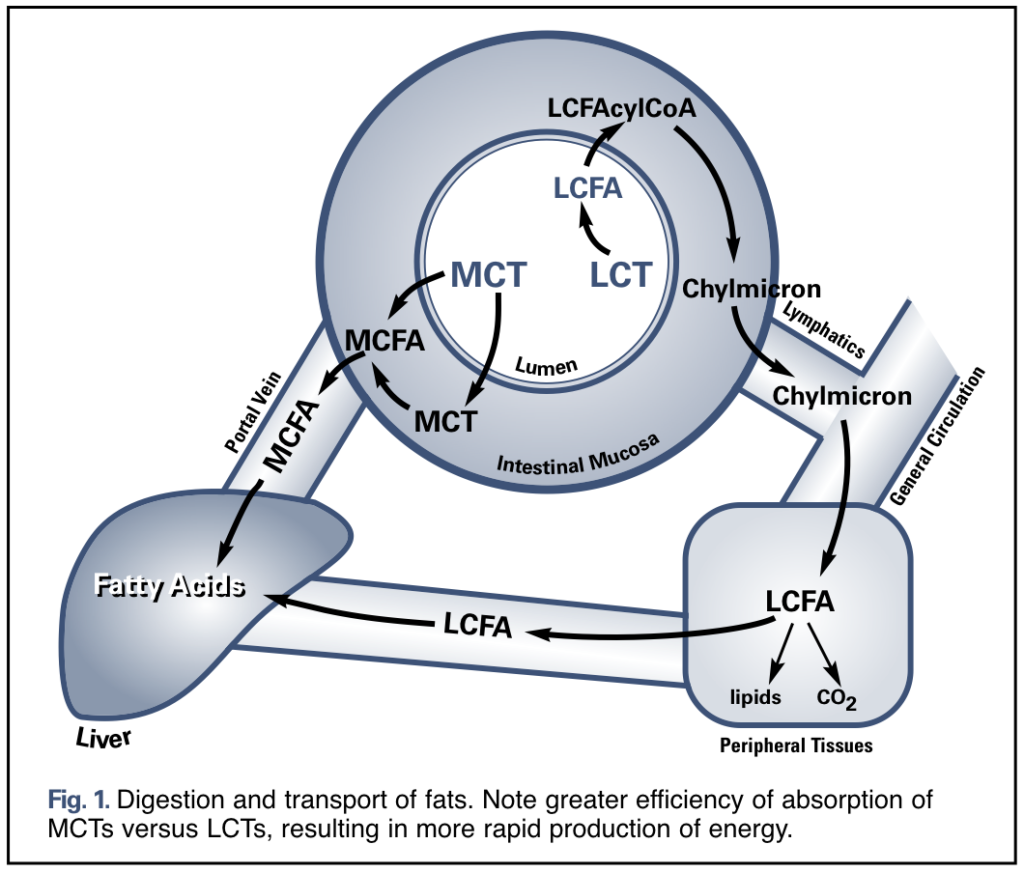
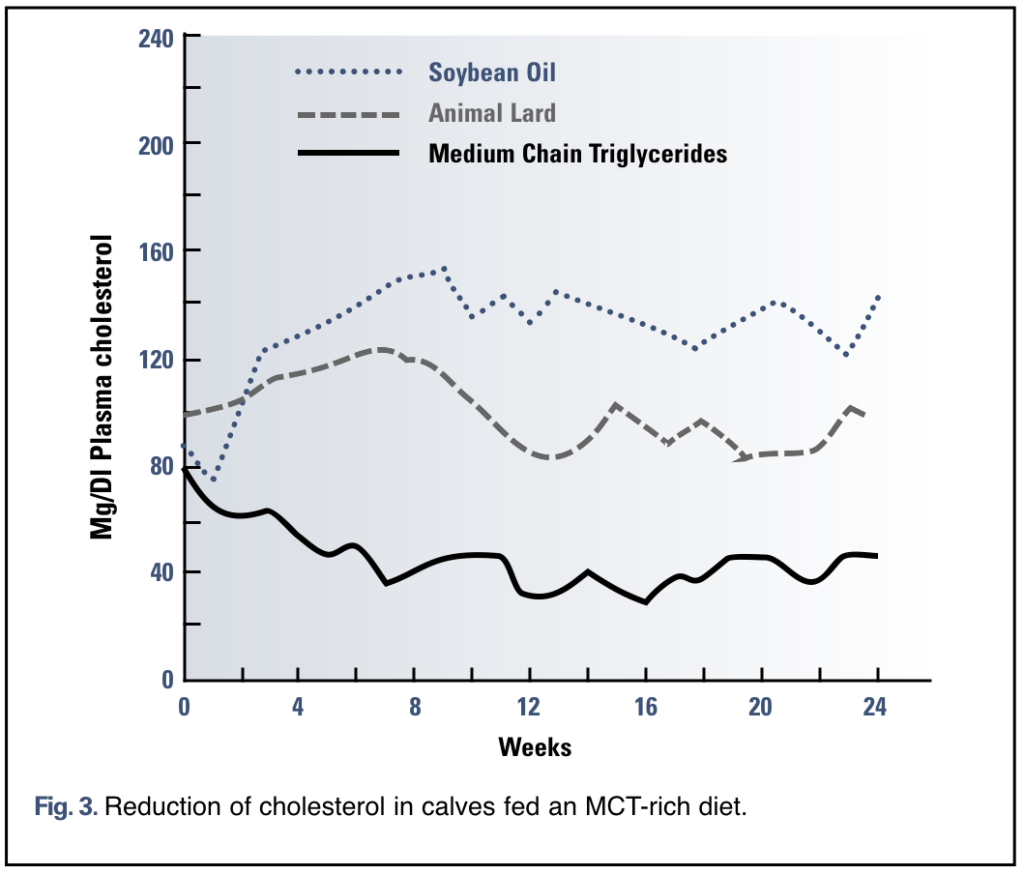
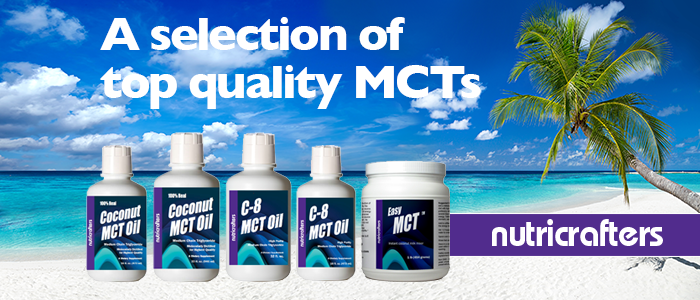

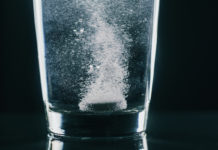


[…] I got this trick from Kimberly Snyder, author of The Beauty Detox Foods. She calls it “Energy in a Spoon.” While getting your caffeine fix from another cup of coffee might give you a quick boost, it won’t sustain your energy. Bee pollen has many benefits and is packed with essential nutrients that can fuel your body and increase your stamina and focus. Coconut oil is made up of Medium Chain Triglicerides (MCTs), which your body can quickly burn as energy. […]
[…] Beneficial Effects on Energy, Atherosclerosis and Aging […]
[…] delicious. If you follow a low carb or paleo style diet, this dish is ideal. By using sea salt and MCT Oil, this dish becomes Paleo porn! Paleo junkies love the nutritional value of brussel sprouts, sea […]
[…] Ward Dean, MD on Nutrition Review, MCTs are “Medium Chain Triglycerides (MCTs) are a unique form of dietary fat that impart a […]
[…] But the science is already freely available. In one animal study, the MCTs in coconut oil were found to lower serum cholesterol levels in rats and calves, as well as cholesterol in the liver and other tissues. Generally speaking, MCTs have demonstrated anti-coagulation effects, meaning they can help prevent the development of atherosclerosis and cardiovascular disease. Dr. Ward Dean, M.D., has compiled an extensive listing of the health benefits associated with MCTs, which is available through Nutrition Review. […]
[…] In eerdere versies van bulletproof coffee voegde ik behalve grasboter ook kokosolie toe aan de mix. Nog beter is om MCT olie te gebruiken. Zo staat het ook in het originele recept van Dave Asprey. Waar staat MCT voor? MCT betekent ‘medium-chain triglycerides’ oftewel middellange keten vetzuren. Het is een extract van kokosolie. De voordelen? Je lichaam gebruikt de olie direct als energie en slaat het vet niet op. Het versnelt je metabolisme en het is goed voor je vetverbranding (bron). […]
[…] I got this trick from Kimberly Snyder, author of The Beauty Detox Foods. She calls it “Energy in a Spoon.” While getting your caffeine fix from another cup of coffee might give you a quick boost, it won’t sustain your energy. Bee pollen has many benefits and is packed with essential nutrients that can fuel your body and increase your stamina and focus. Coconut oil is made up of Medium Chain Triglicerides (MCTs), which your body can quickly burn as energy. […]
[…] https://nutritionreview.org/2013/04/medium-chain-triglycerides-mcts/ […]
[…] healthy saturated fats. More specifically, they contain a fatty acid chain called “Medium Chain Triglycerides” or “MCTs.” These medium chain triglycerides are shown […]
[…] triglycerides (MCTs) which actually support weight loss, provide a quick source of energy, and promote healthy building of new muscle tissue. While losing weight isn’t a goal of mine any more, maximizing athletic performance […]
[…] chain triglycerides: Beneficial effects on energy, atherosclerosis and aging. Nutrition Review. https://nutritionreview.org/2013/04/medium-chain-triglycerides-mcts/ Published 22 April 2013. Accessed 8 Feb […]
[…] low-carb ketogenic diet, and even goes so far as to say that achieving ketosis through the use of MCT oil might be ‘cheating’, I decided to try it for […]
[…] it, I also use a dab as deodorant and it reduces odor-causing bacteria. Coconut also is loaded with medium chain fatty acids, which means your body can quickly and efficiently use it for fuel (so you don’t have to eat so […]
[…] Medium-Chain Triglycerides (MCTs). This type of fatty acid is processed much more efficiently than the long-chain versions. It goes directly to the liver as a quick energy source rather than stored as fat in the body. In return, MCTs can give your metabolism a boost and help your body burn more fat throughout the day. […]
[…] Is Best? How to Choose a Coconut Oil.” Coconut Oil. CoconutOil.com, Web. Dean, Ward. “Medium Chain Triglycerides (MCTs).” Nutrition Review. Nutrition Review, n.d. Web. “Health Benefits of Coconut Oil.” […]
[…] Livestrong: List of Foods That Contain Medium-Chain Triglycerides(2) Nutrition Review: Beneficial Effects on Energy, Atherosclerosis and Aging(3) Vivir Salud Mujer: Alimentos ricos en grasas […]
[…] are processed and then stored as fat in your body. Coconut oil is processed differently. It contains medium-chain triglycerides, which your body sends straight from the digestive tract to the liver, where they are either used […]
[…] the kickcravings to the curb and drop fat lists. Here’s a little info on how it works: https://nutritionreview.org/2013/04/medium-chain-triglycerides-mcts/. Try 1-6 (2 Tbsp. 3x/day) Tablespoons/day based on your level of […]
[…] https://nutritionreview.org/2013/04/medium-chain-triglycerides-mcts/ […]
[…] are not the boogey men we were led to believe. Besides, coconut oil’s saturated fats contain Medium-chain triglycerides. These are more beneficial than most triglycerides from meat and other saturated fats that are […]
[…] always use organic virgin cold pressed coconut oil. It has a very high source of MCT’s (medium chain triglycerides) and contains 64% MCFA’s (medium chain fatty […]
[…] What is MCT oil? MCT oil is a medium chain triglyceride or fatty acid. The chain length refers to fatty acid carbon links. Most of the fatty acids we consume are 12-18 carbons long, whereas MCT fatty acids consist of 6-10 carbon links. (Nutritionreview.org) […]
[…] One reason you should consider adding ghee to your diet is because it does contain healthy fats, just like nut butters, avocado, coconut oil, etc. Yes, it is almost purely fat, but used in small amounts it is BENEFICIAL fat. Ghee and other saturated fats (butter, coconut oil) contain short-chain fatty acids that are easily metabolized by the body. This means that the body can easily use the fatty acids and receive the benefits, without having to go through a ton of digesting, breaking down, etc. Butter contains only 12-15% medium- and short-chain fatty acids, whereas ghee contains 25%. These short chain fatty acids are the ones that we want, because they are the ones that have a positive effect on our cholesterol and heart. Here’s an interesting article on all the positives of MCT (medium chain triglycerides). […]
[…] of the stuff can give you an energy boost—the body uses its medium-chain fatty acids as an energy source instead of storing it […]
[…] (MCTs). MCTs are great for your brain health, metabolism, keep you feeling full longer, and are more quickly burned as a source of energy (rather than stored as fat). All of this makes a great alternative to splash on cereals, mix in smoothies, or add to your […]
[…] https://nutritionreview.org/2013/04/medium-chain-triglycerides-mcts/ […]
[…] oil – a keto must have. Full of medium chain triglycerides (MCTs) which are an excellent source for fuel for our […]
[…] “Reduced chain length also means that MCTs are more rapidly absorbed by the body and more quickly metabolized (burned) as fuel (Fig. 1). The result of this accelerated metabolic conversion is that instead of being stored as fat, the calories contained in MCTs are very efficiently converted into fuel for immediate use by organs and muscles.” – Nutrition Review […]
[…] live without this stuff. Its filled with all sorts of delish benefits from grass fed butter and coconut oil (MCT oil). Helloooooo people!!! Why isn’t everyone blending up this cocktail for […]
[…] or you can consume it (MCT oil is used for bulletproof coffee) as it doesn’t have any flavor. Research shows has a lot of benefits for those with metabolic syndrome and can improve blood sugar and appetite regulation. If you are […]
[…] 1) Coconut oil to satisfy hunger: Try adding coconut oil to a meal and you will soon feel satisfied will be fuller for longer. For folks looking to eat less, satiety is important. Coconut oil is a great, healthy addition to your diet that can help effectively suppress your appetite, as it helps produce the feeling of fullness which signals you to stop eating (see research here). […]
[…] https://nutritionreview.org/2013/04/medium-chain-triglycerides-mcts/ Laffel L., “Ketone bodies: a review of physiology, pathophysiology and application of […]
[…] https://nutritionreview.org/2013/04/medium-chain-triglycerides-mcts/ Laffel L., “Ketone bodies: a review of physiology, pathophysiology and application of […]
[…] I got this trick from Kimberly Snyder, author of The Beauty Detox Foods. She calls it “Energy in a Spoon.” While getting your caffeine fix from another cup of coffee might give you a quick boost, it won’t sustain your energy. Bee pollen has many benefits and is packed with essential nutrients that can fuel your body and increase your stamina and focus. Coconut oil is made up of Medium Chain Triglicerides (MCTs), which your body can quickly burn as energy. […]
[…] of hormones, and allowing fat soluble vitamins to function. Medium chain saturated fats are burned as energy, not stored as body […]
[…] burning and 3) Can better contribute to achieving a caloric deficit. If you find this fascinating, this is a great collection of studies done on […]
[…] Sources: Wikipedia ; Nutrition Review […]
[…] oil to benefit our metabolisms and digestion. There’s a great article on the benefits of medium chain fatty acids and a bit more of the science behind what and how it really effects our bodies. Simplified version, […]
[…] In eerdere versies van bulletproof coffee voegde ik behalve grasboter ook kokosolie toe aan de mix. Nog beter is om MCT olie te gebruiken. Zo staat het ook in het originele recept van Dave Asprey. Waar staat MCT voor? MCT betekent ‘medium-chain triglycerides’ oftewel middellange keten vetzuren. Het is een extract van kokosolie. De voordelen? Je lichaam gebruikt de olie direct als energie en slaat het vet niet op. Het versnelt je metabolisme en het is goed voor je vetverbranding (bron). […]
[…] metabolized quicker by the body. In isolation, it turns out MCTs are pretty good for you (here are some more benefits), the problem is only around 10 percent of the saturated fat in coconut […]
[…] Dean, W., & English, J. (2013). Medium Chain Triglycerides (MCTs). Retrieved October 26th, from https://nutritionreview.org/2013/04/medium-chain-triglycerides-mcts/ […]
[…] https://nutritionreview.org/2013/04/medium-chain-triglycerides-mcts/ […]
[…] It has also been found to increase metabolism, curb cravings and help with your immune system. […]
[…] of the stuff can give you an energy boost—the body uses its medium-chain fatty acids as an energy source instead of storing it […]
[…] Dean W & English J. (2013). Medium Chained Triglycerides (MCT): Beneficial Effects on Energy, Atherosclerosis, and Aging. Nutrition Reviews. Retrieved January 28, 2016 from https://nutritionreview.org/2013/04/medium-chain-triglycerides-mcts/. […]
[…] Medium-Chain Triglycerides (MCTs). This type of fatty acid is processed much more efficiently than the long-chain versions. It goes directly to the liver as a quick energy source rather than stored as fat in the body. In return, MCTs can give your metabolism a boost and help your body burn more fat throughout the day. […]
[…] are two sources for those interested in more reading: https://nutritionreview.org/2013/04/medium-chain-triglycerides-mcts/ […]
[…] Medium Chain Triglycerides (MCTs): MCTs are a unique form of dietary fat that is rapidly absorbed by the body and quickly metabolized as fuel. They provide a wide range of positive health benefits including enhanced energy and immunity, appetite and weight control, and prevention of atherosclerosis to name a few. […]
[…] The theory behind the rapid energy production of MCFAs is that they create an excess of Acetyl-CoA within the cells that leads to a rapid formation of Ketone bodies – high energy compounds we’ll be looking at later. https://nutritionreview.org/2013/04/medium-chain-triglycerides-mcts/ […]
[…] Fats are essential in a healthy diet, and choosing healthy unsaturated fats — think olive oil, nuts, fatty fish — boosts heart health, ups nutrient absorption to prevent energy-zapping deficiencies and serves as a great source of energy, at 9 calories per gram. Up the energy-boosting potential of your diet by adding medium-chain fatty acids, like the ones found in coconut oil. These fats digest fast, so you’ll get an almost-instant source of energy, and they may actually boost your endurance during workouts. […]